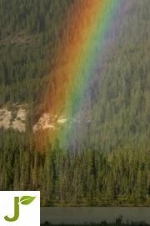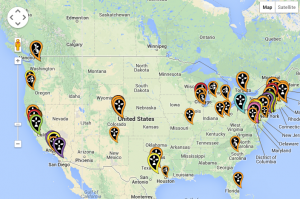Rabbis Subscribe
A selection of initiatives, blogs, resources and communities on Jewcology intended for use by rabbis.
From the Blogs
“Farm the Land Grow the Spirit Summer 2015″
flgs_2015 This ia a free opportunity for young adults 19-29 to come together in an interfaith setting for Jews, Christians and Muslims to live, farm and study together from June 1st - July 23rd 2015 at the Stony Point Conference Center in Stony Point, NY, with time for mentoring and vocational discernment. It is a Multifaith, Peace, Justice and Earthcare program. We seek students who are grounded in their religious tradition, serious about spriiuality and the state of the planet, and open to learnig and living in an intentional community setting. This is our 6th ...
The MAP: Sukkot (and Shmita) Resources and Events
SUKKOT AND SHMITA RESOURCES AND EVENTS contributed by all the organizations and initiatives on “the Map” http://jewcology.org/map-of-initiatives/ Here’s a quick bit of Sukkot Torah to start us off: “The four species of the lulav represent the four types of ecosystems in the land of Israel: desert (date palm), hills (myrtle), river corridors (willow), and sh’feilah, the lowlands (etrog). Each species has to be fresh, with the very tips intact – they can’t be dried out, because they hold the water of last year’s rain. Together, they make a kind of map ...
Jewish literary theorist coins ‘cli fi’ genre term for climate change awareness
Danny Bloom grew up in western Masschusetts in the 1950s, studied Jewish ideas under Rabbi Samuel Dresner, was bar-mitvahed in 1962 under the cantorial direction of Cantor Morty Shames and then started travelling. France, Israel, Greece, Italy, Alaska and Japan. Now he's 65 and working on what he calls a very Jewish project, Jewish because it comes out of ideas and values about having a vision and being a dreamer that he picked up on his way to becoming a bald, goateed senior citizen. Bloom lives in Asia now working as a public relations writer and ...
Can we see all Earth as our Holy Temple of today?
There are two crises in the world today that call especially for Jewish responses: One because it involves the future of a state that calls itself “Jewish,” and of its supporters in America -- their spiritual, intellectual, ethical, and physical futures – at a moment when the relationship between Jews and our Abrahamic cousins of Palestine is filled with violence that threatens to kill more people, breed more hatred, and poison the bloodstream of Judaism and Jewish culture; The other because it calls on Judaism as –- probably uniquely ...
Moving Forward with “Move Our Money/ Protect Our Planet”
More than 100 Rabbis, Cantors, and other Jewish spiritual leaders have signed the Rabbinic Call to Move Our Money/Protect Our Planet. (Providentially, not planned by us, the initials spell “MOM/POP.”).! There are now four initiatives we want to take toward giving additional reality to this Call: 1) Sabbatical/ Shmita Year In Leviticus 25, the Torah calls for the human community to let the Earth rest from organized agriculture every seventh year -- a Sabbatical Year called Shabbat shabbaton or Shmita ("Release" or "Non-attac...
70+ Rabbinic Call to Move Our Money to Protect Our Planet
Dear chevra, By April 30, 2014, more than 70 Rabbis and other Jewish spiritual leaders have signed this Call. Now we appeal to all members of the Jewish community to join in this effort. To do so, please click to: <https://theshalomcenter.org/civicrm/petition/sign?sid=11&reset=1> We — Rabbis, Cantors, and other Jewish spiritual leaders — call upon Jewish households, congregations, seminaries, communal and denominational bodies, and other institutions: Move Our Money to Protect Our Planet. In the ancient tradition ...
Earth Day Every Day – Join a Webinar!
Tuesday April 22nd marked the 44th annual Earth Day! What will you do this year to protect our planet? Join the Religious Action Center of Reform Judaism (the RAC) in commemorating Earth Day with an online information session on how to successfully create a green “culture” in your congregation. How do we make our environmental efforts an integral part of the culture of our congregational communities? How do we align our actions with our Jewish beliefs of environmental stewardship? Our synagogues have the potential to model environmental behavior and ...
Uplifting People and Planet
Exciting news! Just in time for Tu b’Shevat, Canfei Nesharim and Jewcology are proud to announce the launch of a new ebook exploring traditional Jewish teachings on the environment, Uplifting People and Planet: Eighteen Essential Jewish Lessons on the Environment, edited by Rabbi Yonatan Neril and Evonne Marzouk. This ebook is the most comprehensive study in English of how Jewish traditional sources teach us to protect our natural resources and preserve the environment. From food to trees, energy to water, wealth to biodiversity, the book studies eighteen ...
A Tu B’Shvat Seder to Heal the Wounded Earth
The New Year – for Rebirthing Trees: [This version of the Haggadah for Tu B’Shvat has been greatly adapted by Rabbi Arthur Waskow of The Shalom Center from a Haggadah shaped by Ellen Bernstein, as published in Trees, Earth, and Torah: A Tu B’Shvat Anthology (Jewish Publ. Soc., 1999, ed. by Elon, Hyman, & Waskow). Bernstein wrote introductory remarks to sections of that Haggadah, many of which have been included or adapted for this one. They are indicated in the text by the initials “EB.” * The desire for such a Haggadah grew from ...
Is Fur a Jewish Issue?
Jewish worshipers chant every Sabbath morning, "The soul of every living being shall praise God’s name" (Nishmat kol chai t’varech et shim’chah). Yet, some come to synagogue during winter months wearing coats that required the cruel treatment of some of those living beings whose souls, we declare, praise God. Should Jews wear fur? Several factors should be considered: 1. What does the Jewish tradition teach about the treatment of animals? 2. How much suffering do animals who are raised or trapped for their fur experience? 3. Does the wearing of fur coats have ...
Hey American Rabbis: Wake Up and Smell the Cruelty
From their perch in America, many Diaspora Jews look at the Orthodox Rabbinate in Israel as a bunch of Neanderthals who use clubs to beat back any modern innovation or progressive idea. No offense to any Neanderthals. But The Beet-Eating Heeb, for one, might have to revise his assessment of Israel’s Rabbinical leadership. On one issue that is near and dear to BEH’s heart, and probably to yours as well, the newly elected Chief Ashkenazi Rabbi of Israel recently made a very enlightened statement. And BEH is all for giving credit where credit is ...
Will Scandal at Israeli Slaughterhouse Change Jews’ Diets?
"We will not tolerate giving kashrus supervision to a factory that ignores animal cruelty issues." This statement by the recently elected Ashkenazi Chief Rabbi of Israel David Lau, along with his promise to look into the kashrus status of facilities where abuses of animals occur, has the potential to greatly change the ways that animals are raised and slaughtered, as well as the eating habits of Jews. Chief Rabbi Lau expressed his outrage and concerns after seeing a video shown on Israeli television’s channel 10 Kolbotek program on October 29. The video had underc...
The Urban Adamah Fellowship Now Accepting 2014 Applications
Connect to Something Bigger: Earth, Community, Social Justice, Jewish Spirituality The Urban Adamah Fellowship, based in Berkeley, CA, is a three-month residential training program for young adults (ages 21–31) that combines urban organic farming, social justice training and progressive Jewish learning and living within the setting of an intentional community. Through the operation of Urban Adamah’s one-acre organic farm and internships with social justice organizations, fellows gain significant skills, training and experience in all aspects of ...
“Keep the Tar Sands where they are; Climate change has gone too far!”
Configure Those words were chanted by more than 200 people in a vigorous protest I took part in on Aug 12, 2013, at the State Department in Washington, DC, against the Tar Sands Pipeline. The action was organized by CREDO Action, the Rain Forest Action Network , and The Other 98%. The Shalom Center and Interfaith Moral Action on Climate (IMAC) endorsed the protest, and our readiness to risk arrest. We ranged in age from 18 to 79 – students, grandparents, clergy, former Obama volunteers, ...
Restoring and Transforming the Ancient New Year for Animals
Another Jewish holiday? Don't we have enough already? Not according to Jewish Vegetarians of North America (JVNA), of which I am president emeritus. We are working with a coalition of Jewish groups and individuals to restore and transform the ancient and largely forgotten Jewish holiday of Rosh Hashana L'Ma'aser BeHeima (New Year's Day for Tithing Animals for sacrifices when the Jerusalem Temple stood) into a day devoted to increasing awareness of Judaism's beautiful teachings on compassion to animals. These teachings include: (1) “God's compassion is over all His ...
Shmita Today: From Farm to Hypertech
Our society is more and more deeply concerned that intrusive human action toward the Earth is turning into a weapon endangering Humanity itself as well as the earthy web of life. Is this danger new, or is it an extension of a long-felt weakness arising from a strength too far? Torah warns against overworking the earth, as well as overworking ourselves and each other. It provides that not only every seventh day but every seventh year is to be a time to pause from working. The seventh year is to be Shabbat Shabbaton, Restfulness to the exponential power of Restfulne...
Tisha B’Av and Vegetarianism
There are many connections between vegetarianism and the Jewish holiday of Tisha B'Av: 1. Tisha B'Av (the 9th day of the month of Av) commemorates the destruction of the first and second Temples in Jerusalem. Today the entire world is threatened by climate change, and modern intensive livestock agriculture is a major contributor to greenhouse gas emissions. 2. In Megilat Eichah (Lamentations), which is read on Tisha B'Av, the prophet Jeremiah warned the Jewish people of the need to change their unjust ways in order to avoid the destruction of Jerusalem. Today, climate ...
RELATING TISHA B’AV TO TODAY’S ENVIRONMENTAL CRISES
Tisha B'Av (the 9th day of the month of Av) which we commemorate this year on July 15-16, reminds us that over 2,000 years ago Jews failed to heed the warnings of the prophet Jeremiah, with the result that the first Temple in Jerusalem was destroyed, the first of many negative things that occurred on that day, including the destruction of the second Temple as well. Today there are many "Jeremiahs" warning us that now it is the entire world that is threatened by climate change and its effects, species extinction, soil erosion, destruction of tropical rain forests and ...
Tnuva Admission of Inherent Animal Abuses Should Get Dietary Issues Onto the Jewish Agenda
Pauline Dubkin Yearwood and Richard Schwartz "Slaughtering by its very nature causes the animals great suffering." Who said this? A vegan activist or someone from an animal rights group? That’s what you'd think, but prepare to be shocked: The statement was made by a major Israeli dairy and meat producer, Tnuva. The company is currently the defendant in two independent class action suits related to the mistreatment of animals at its Beit She'an slaughterhouse, where it produces meat under the name Adom Adom. The ...
Jewish Energy Guide: Washington’s Green Shuls
By Joelle Novey Every Jewish community I have visited strives to honor the words of the Torah. Physically, we adorn the scroll beautifully, carry it carefully, touch it lovingly and read from it publicly. Spiritually, we pray that our hearts will open to its teachings, we study its words and generations of commentary on its words, and we affirm in community that its ways are ways of pleasantness and all its paths are paths of peace. To many Jews, the thought of a ripped or damaged Torah scroll is almost physically painful. In the Tanya, a classic work of Hasidic ...





